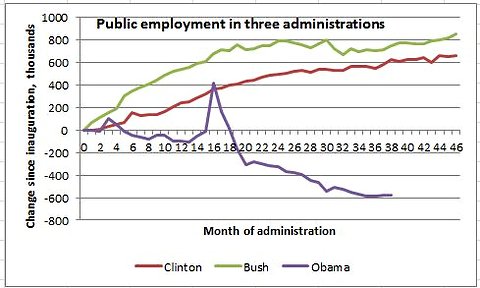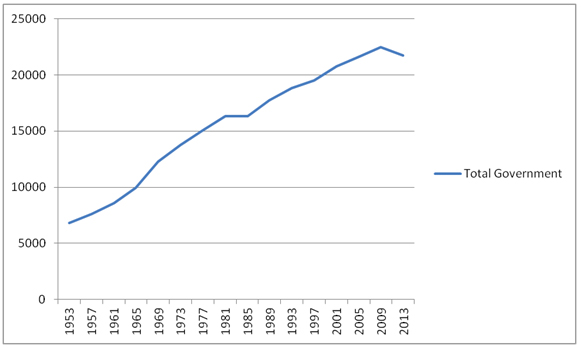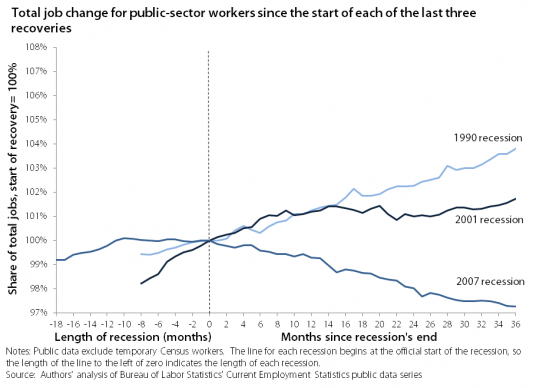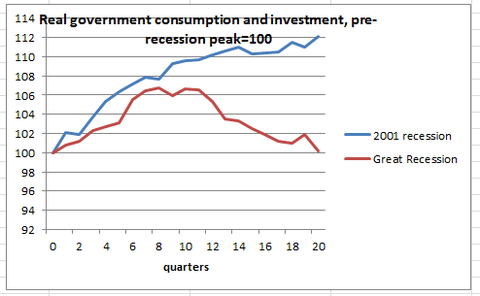Category: President Obama
Of Crabs and Men – How Economic Spite and Fear Gets Us Nowhere
“If I have it this bad, why shouldn’t they?” You’d think words like this only came from annoying toddlers, but I hear it all the time here, usually speaking about teachers, but more broadly it’s about all government employees. I had a discussion the other day with someone that claimed government employees never got hit by the recession. Not only that, but he argued that it’d be good if they did get hit even more. This isn’t the first person I’ve met with that sort of mindset, nor will it be the last.
First, this factually wrong, because pay raises were stopped and harsh budget cuts were enacted in state and local governments throughout the US. Many workers were laid off, and hiring was frozen, leaving those lucky enough to have a job to pull things together and perhaps do the work of more than one person. The LA Times points to a report by the Nelson A. Rockefeller Institute of Government, “which calculates that while private-sector employment is down 3.1% from its peak in January 2008 and on the rebound, state and local government employment is down 3.4% from its peak in August 2008 and continuing to slide.” In addition to this, because of the commitment the public sector has to equal opportunity and affirmative action, the recession in the public sector is hitting women and African Americans the hardest.
It’s not only wrong, though. It’s dangerous, and there’s a great phrase for it. That phrase is crab mentality, and it refers to a scenario of crabs in a bucket. Individually they could escape, but they end up pulling each other back down. In the end none of them escape. This collective antagonism kills any chance that any will survive. It’s a very similar thing here, especially when you’re talking about a recession. Conventional wisdom is that during a recession the government will need to spend a bit more in order to jump start things and get the economy back on its feet. Conventional wisdom also says during this time, through no real fault of their own, many more people will need government programs. That’s just factually what a recession does, and that’s just factually how one gets out of a recession. Like the crabs, stuck in their bucket, though, we end up either not helping each other upward or even not letting our fellow humans climb. Like the crabs we end up pulling others downward.
When people are frustrated with their own lives they have a tendency to lash out at others. This translates to a feeling that government employees should be cut down even more. Let’s go over exactly why such a reaction would be terrible. Right now we’re not in the midst of a recession, but our unemployment still sits at 7.9%, and a lot of people are wondering exactly why we can’t lower that. Well, if you look at this chart you can see at least one reason:
And here’s what the Economic Policy Institute says about that graphic:
How many more jobs would we have if the public sector hadn’t been shedding jobs for the last three years? The simplest answer is that the public sector has shed 627,000 jobs since June 2009. However, this raw job-loss figure understates the drag of public-sector employment relative to how the economy functions normally.
Over this same period, the overall population grew by 6.9 million. In June 2009 there were 7.3 public-sector workers for every 100 people in the U.S.; to keep that ratio constant given population growth, the public sector should have added roughly 505,000 jobs in the last three years. This means that, relative to a much more economically relevant trend, the public sector is now down more than 1.1 million jobs. And even against this more-realistic trend, these public-sector losses are dominated by austerity at the state and local level, with federal employment contributing only around 6 percent of this entire gap.
Paul Krugman points out a very similar thing here:

His assessment is that if public employment mirrored the growth under Bush that by the time he wrote this (April 25, 2012) we’d have 1.3 million more government workers, and our unemployment rate would be less than 7 percent. That’s a almost a full point lower than it is now, and he wrote this a year ago!
In Wisconsin this fight against public workers came down to a fight about collective bargaining. Despite the fact that there’s really no correlation between collective bargaining and state budget deficits, that right just had to go.
Here’s what The New Republic says about the rollback in rights:
What proponents of the rollback in public-sector bargaining rights are unable to explain is how taking rights away from some American workers will improve the lot of others. How will denying collective bargaining rights for teachers, social workers, or parks employees in Wisconsin create good jobs in the private sector? How will taking away the rights of prison guards to bargain collectively in Ohio keep manufacturing jobs in the United States? How will reducing the pensions promised to government workers (often in return for their agreement to forego salary increases) create retirement security for private sector workers whose paltry 401Ks are unable to support them? How will holding down public-sector pay stop the erosion of the American middle-class—of which public-sector workers constitute a significant proportion?
What proponents of cutting government employment are unable to explain is how taking away jobs and cutting pay will help improve the lot of others. How will it helps a small business owner to have one more potential customer lose his job? How will it help him to have another potential customer get a cut in pay? What needs to be explained to everyone who proposes something like this is the interconnectedness of our entire economy. We are not islands with no relation to each other. Your spending is my potential profit. A cut in your pay is a cut in my potential profit. If that teacher you’re so jealous of gets her job cut, then that means every business she shops at gets their business cut. It’s all connected.
A solid example of this is found in the numbers released last week that show the US economy shrunk by .1 percent late last year. The reason for this? Government spending cuts. A lot cheered because those are spending cuts in our bloated defense budget, and I’d likely agree, but we shouldn’t cheer about an all around cut at this point. Cuts should still be made up elsewhere with spending, so that someone can at least chase that profit and we can all experience more hiring and more growth. Every cut we make at this point represents a cut to someone’s income or job somewhere.
Krugman goes further in blaming that shrinkage on the shrinking government sector. He says that “transfer payments like Medicare and Social Security are rising (although unemployment benefits are falling), but government purchases of stuff — mostly at the state and local level, where the stuff in question includes hiring schoolteachers — has been in fairly rapid decline.”
What this shrinkage translates to is, according to him, a possible 1.5 percentage point higher unemployment than what we should have right now.
The result of his absolutely historic spite and fear throughout our state, local, and federal governments is seen here:

We’ve hit a historic decline in our government at one of the absolute worst times to do it.
John T. Harvey does a good job of pointing out exactly why the private sector needs the government to spend. He points out that the real drivers of economic growth are in Investment and Government Spending. Since WWII, government spending has been an affective counterbalance to business cycle falls in investment. When a recession hits, government spending, without any sort of legislation attached, goes up simply because of less tax receipts and more people qualifying for things like unemployment. It’s this spending that makes these recessions less severe and damaging to the country overall, and it’s at least partially why we didn’t experience another Great Depression.
So, we really should not give in to fear and spite. I realize that a lot of people now are working themselves to the bones, perhaps with two or three jobs, and not seeing much in the way of raises. Seeing someone else doing ok can be hard, but we must not let that mean we should take it from them. That hurts us all in the long run. It’s like cutting off your nose to spite your face. Pulling down your fellow humans as they try and escape from the bucket into the middle class during this recession does nothing but doom us all to continuing stagnation. Instead of looking to one another to see what we should cut down at this time, we in the private sector should really be looking to one another and seeing how we can come together to demand better. After all, the “U.S. corporations’ after-tax profits have grown by 171 percent under Obama, more than under any president since World War II.” The money is there. We just have to demand it. And then things will grow, because we all have more to spend.
Is The Era Of Liberalism Really Back?

This week, Mitch McConnell declared the “era of liberalism is back” in response to President Obama’s Inaugural Speech on Monday. Conservatives in the media and online have gone ballistic over the speech; one that they claim is overly partisan and mixed with a highly liberal agenda. But is this actually true?
Well, Obama’s speech didn’t talk much about the fiscal issues of the day and really seemed to focus on a much more social agenda. These issues seemed to be focused on the rights of gays, climate change, immigration, and even a small nod to guns control. And you know what? Mitch McConnell and the Republicans are right to say that this was a very liberal speech.
For 1950.
Obama’s Modern Liberalism & The Pursuit of Happiness
In his 1978 State of the Union address, President Jimmy Carter said “Government cannot solve our problems, it can’t set our goals. It cannot define our vision. Government cannot eliminate poverty or provide a bountiful economy or reduce inflation or save our cities or cure illiteracy or provide energy. And government cannot mandate goodness.” In 1996, just months before signing a bill into law that dramatically changed how the government helps the poor, President Bill Clinton stated “The era of big government is over.” By reading those quotes, you’d think they would’ve come from Ronald Reagan or George W. Bush, not two of the three most recent Democratic Presidents. It’s felt like many of our recent Democratic Presidents have had to run away from being Democrats in order to be politically viable.
This changed Monday morning, when President Obama, in his second inaugural address, made the strongest and most vocal defense of liberalism and expansive government action since President Lyndon Johnson and his Great Society initiative. In his speech, he made a passionate defense of government “entitlement” programs, saying “the commitments we make to each other – through Medicare, and Medicaid, and Social Security – these things do not sap our initiative; they strengthen us. They do not make us a nation of takers; they free us to take the risks that make this country great.” He devoted an entire paragraph of his speech to climate change, a topic that many have felt is politically unviable for some time. He alluded to his initiative to curb gun violence. By all accounts, this is the most progressive speech of his Presidency.
Much of President Obama’s speech hinges on references to our nation’s history. One of the most prominent connections between this President and another one of our past Presidents comes through their historical allusions.
Is Obama a Magician? New Negotiating Tactics for his 2nd Term
When you’re dealing with a master of sleight of hand, even the simplest activity may be a complex deception. To understand the complexity of a magician’s life, according to Penn in this video, you need to know the seven basic principles of magic.
Palm – To hold an object with an apparently empty hand
Ditch – To secretly dispose of an unneeded object
Steal – To secretly obtain a needed object
Loan – Secretly move the needed object to where its needed
Simulation – To give the impression that something that hasn’t happened has
Misdirection – Lead attention away from the secret move
Switch – Secretly exchange one object for another
Those are the seven principles of magic, and with them you can do wondrous things. Now, what if I told you they could not only be applied to magic, but also to negotiating? When the new year rolled around, quite like magic, we witnessed a party begrudgingly going along with something they clearly didn’t want to. They enacted what was, while technically speaking a tax cut, in essence a tax raise in their minds with almost nothing in return for it. This was the same party refusing beforehand to vote on “what we all agree on,” as Obama put it. This was the party of no.
So, how did Obama perform this trickery? Like a well-trained magician, he had to know his audience. The audience in this act was threefold. One piece of this audience, the Republicans would always look to attack him on nearly anything and everything. Again, they’re the party of no. So, going into this he knew it would be no. No compromise. Nothing. Like the magician that must be keenly aware of what and where his audience will be watching and questioning, Obama had to know this. He had to finally understand this. Another of his audiences, the media, would always try and see things from the middle, and they’re obsessed with very serious people, as Paul Krugman puts them, and as such a push for a grand bargain that has tax raises and spending cuts would be just the sort of thing they could get their panties wet for. And last, he had to know us. That is, he had to know both the liberal and the republican base.
Next, quite like Teller, he used a bit of sleight of hand. Like the magician about to saw a lady in half, he stood atop the stage during his campaigning and proclaimed, “I will raise taxes on those making above $250,000 per year.” And, despite how popular this plan was, we all didn’t really know how it could be done with the Republicans likely still having control of the house. Their pledges to Grover Norquist make this feat about as hard as making an elephant disappear before your very eyes.
LBJ and the Famous 89th
Pictured above: President Johnson signs, as Martin Luther King Jr. watches him, the Civil Rights Act of 1964
Today is MLK Jr. Day, and as we all know, Martin Luther King Jr. was one of the leaders of the Civil Rights Movement. This movement culminated in the passage of two of America’s most important pieces of legislation: the Civil Rights Act of 1964 and the Voting Rights Act of 1965.
Today’s also the day that Obama gave his second and final inaugural address. Most of those who watched the speech agree that it was one of, if not the most, progressive speech Obama ever gave. In it he espoused equality for pay among men and women, the freedom to marry whomever we love despite our lover’s gender, how voting should be the easiest thing to do in the world, and that we need – we absolutely must – tackle climate change. That’s not everything he mentioned, but what was clear in Obama’s speech was that an activist government is better than a government that doesn’t do anything. How government action doesn’t make us less free, it makes us more free, because the more risk we bear together and as a nation, the more risk we can take as individuals and succeed.
So let’s go back about fifty years, to a clear demonstration of the kind of activist and good government Obama was talking about, and realize how America is now better off.
Happy Inauguration Day!
While many political nerds will spend the day glued to their televisions watching the day’s proceedings unfold, many are wondering just what will be the defining issues of this second term. Historians are quick to note that second term Presidents are known to attempt for an overreach in power and many also face scandals of various sorts. Eisenhower saw his party get beaten pretty badly during his second term. Clinton saw an impeachment scandal. George W. Bush botched a disaster response and presided over the greatest economic calamity in nearly a century. Though despite this, Albert R. Hunt of the New York Times writes that President Obama is very much aware of these events and the other types of issues that second-termers face. To me, this is just another piece of evidence that President Obama wants to be remembered as more than the first African American President; he wants the first African American Presidency to be a good one in the history books.
The question that many observers are asking is; what can we expect from a second Obama Administration?
Patronizing and the Gun Debate
Bill Clinton recently warned about gun control, “Do not patronize the passionate supporters of your opponents by looking down your nose at them.” I wasn’t there, but I’m sure he said it in his charming southern tone. Likely he had a twinkle in his eye, and that slight smirk on his face as he awaited the applause. Everyone loves Bill Clinton, right? Well, not all the time , but still, he’s a pretty charismatic guy who nearly single-handedly defeated Mitt Romney with his speech at the DNC. (Who knew such a long, technical speech would work so well in this day and age? I certainly didn’t.) He knows how to get things done with the other side, even when they’re things his own side is not entirely too sure about.
With regard to gun control, it may sometimes be hard not to patronize certain folks. I must admit, I shook my head upon hearing of the many accidents that happened on yesterday’s so-called “Gun Appreciation Day.” A 12 gauge shotgun discharged in Raleigh, North Carolina, injuring three people. Another man was injured in Medina Ohio when a gun dealer accidentally shot a bystander. Last, but certainly not least, another man shot himself while loading his gun outside the Gun and Knife Show in Indianapolis. Thankfully, no one was killed in any of these incidences, so I don’t feel so bad pointing out the palpable irony in it all.
It’s also hard not to patronize those who say things like “[Guns] … are absolutely essential to living the way God intended for us to live.” Now, it may be truthful to say that guns are great for self defense, and that self defense leads you to a new sense of safety, but to say that your God intended it this way just rings a little on the side of crazy to me. I would hate to say that God intended us to live in a constant state of fear for the lives of our family and friends unless we purchase a tool meant for killing. That’s not even mentioning that Jesus himself said, Put your sword back in its place, for all who draw the sword will die by the sword.” I know a sword isn’t a gun, and the situations are at least a bit different, but this is one of the definite, quotable things he said, not that we can count on certain people to actually listen to his words…
And it’s also so hard not to patronize Alex Jones when he starts a petition to deport Piers Morgan and then went on his show to scream that 1776 will commence again! But, that’s Alex Jones, and I guess it’s safe for us to all-out trivialize him, and the interview’s entire purpose was probably to highlight just how breathtakingly crazy he is.
Dead Heat: The Story of the Green Party
(Start scene of non-erotic political fan fiction.)
It was 11 pm. The dead heat of the night consumed the air. Cheri Honkala paced nervously back and forth across the room. Dozens of hurried aides worked diligently around her. They answered phone calls, popped tums, and occasionally stole a glance at the disheveled Honkala. These twenty something youngsters might witness history but they had to keep their mind busy, or get crushed by the wrath of the Honk, a nickname first given to Honkala by her defeated opponents. During the madness a white haired lady occupied the organic cotton couch near the fluorescent HD TV. She sipped an organic home brew of green tea as she flipped channels between NPR and C-SPAN. At the same time her eyes gazed at an Al Jazeera stream on her MacBook while she gripped her iPhone, as to not miss any important text vibrations. Yet through this haze of electronic acrobatics, the lady gave off an aura of tranquility. It annoyed the Honk.
(I don’t know if they really call her the Honk.)
“Stein why are you so calm!” Honkala bellowed at her running mate.
The petite woman offered her some tea. “Please Cheri, call me by my first name.”
Honkala sighed, “Jill I don’t want your damn tea. How can you be so calm during this dead heat? It’s literally a virtual dead heat!”
Jill nodded and sipped some tea. “Right you are my friend. It is a dead heat.”
Saturday Morning Cartoon – Obama’s Cabinet Diversity
Who doesn’t love Saturday Morning Cartoons? No one, that’s who! Well, as adults we’ve grown out of what we’d normally be watching Saturday Mornings (Recess, anyone? … anyone?), but that doesn’t mean we can’t enjoy a nice political cartoon!

I chose this one, because it seems to be the prevailing critique of the day from both the media and the right, partially in response to this picture. Obama has nominated a few white guys as of late. He’s put forward Chuck Hagel, a nice white Nebraskan man, and the boring New England politician caricature John Kerry for Secretary of State. Pretty white there, too. There’s also the squiggly signatured Jack Lew, put forward as Treasury Secretary.



